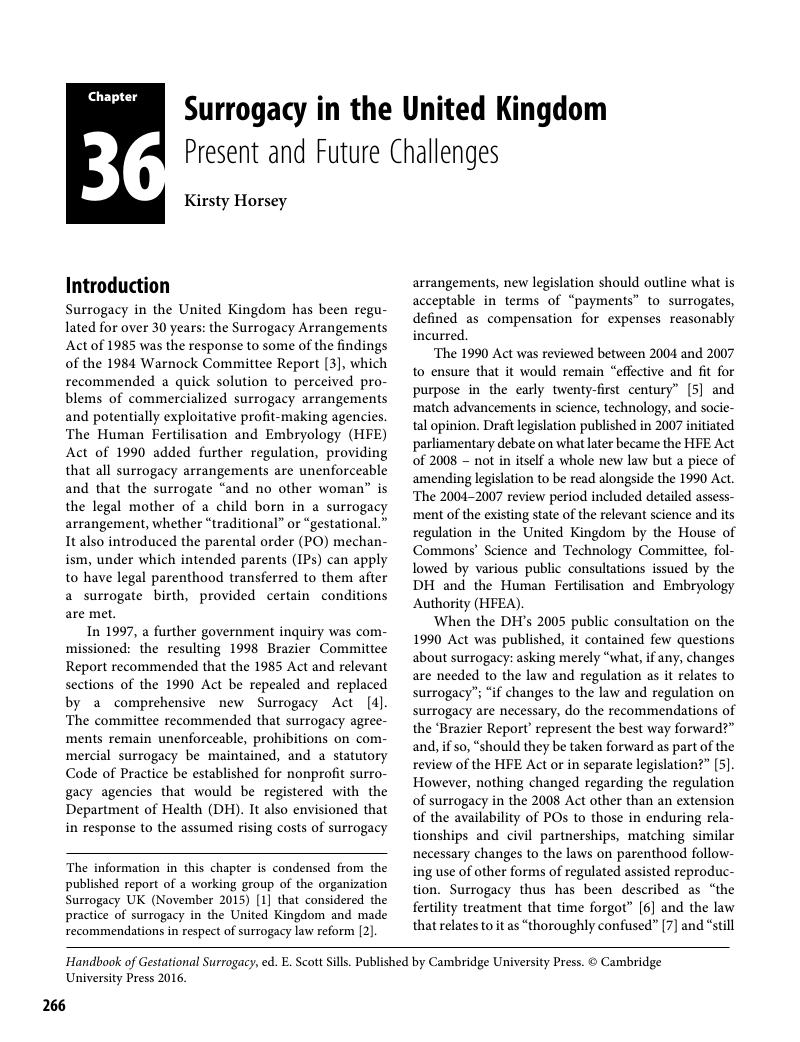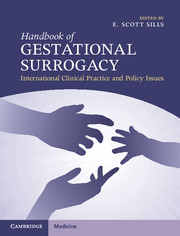Book contents
- Handbook of Gestational Surrogacy
- Handbook of Gestational Surrogacy
- Copyright page
- Contents
- Contributors
- Chapter 1 Surrogacy’s Past, Present, and Future
- Chapter 2 The Ideal Surrogate
- Chapter 3 Gestational Surrogacy, Ethics, and the Family
- Chapter 4 Gestational Surrogacy and the Feminist Perspective
- Chapter 5 Surrogacy’s Changing Social Profile
- Chapter 6 Addressing Global Inequalities in Surrogacy
- Chapter 7 Surrogacy as Medical Tourism
- Chapter 8 LGBT Issues in Surrogacy
- Chapter 9 The Emotion Work of a “Labor of Love”
- Chapter 10 Psychological and Interpersonal Factors in Gestational Surrogacy
- Chapter 11 Saying No to Surrogacy
- Chapter 12 Gestational Surrogacy Agreements
- Chapter 13 Routine Embryo Screening and Surrogacy
- Chapter 14 Gestational Surrogacy in Argentina
- Chapter 15 Gestational Surrogacy in Australia
- Chapter 16 Surrogate Motherhood in Belgium
- Chapter 17 Gestational Surrogacy in Canada
- Chapter 18 A Baby’s Citizenship and Kinship Ties after Surrogate Birth
- Chapter 19 Gestational Surrogacy in the Republic of Georgia
- Chapter 20 Cross-Border Reproductive Surrogacy in India
- Chapter 21 Reproductive Surrogacy in Iran
- Chapter 22 Gestational Surrogacy in the Republic of Ireland
- Chapter 23 Surrogacy in Israel
- Chapter 24 Gestational Surrogacy in Japan
- Chapter 25 Gestational Surrogacy in Korea
- Chapter 26 Gestational Surrogacy in the Grand Duchy of Luxembourg
- Chapter 27 Gestational Surrogacy in Malaysia
- Chapter 28 Reproductive Surrogacy in New Zealand
- Chapter 29 Gestational Surrogacy in Nigeria
- Chapter 30 Gestational Surrogacy in Norway
- Chapter 31 Gestational Surrogacy in Portugal and Brazil
- Chapter 32 Gestational Surrogacy in the Russian Federation
- Chapter 33 Gestational Surrogacy Practice in Sweden
- Chapter 34 Gestational Surrogacy in Thailand
- Chapter 35 Gestational Surrogacy in Ukraine
- Chapter 36 Surrogacy in the United Kingdom
- Chapter 37 Reproductive Surrogacy in the United States of America
- Chapter 38 Gestational Surrogacy Concerns
- Chapter 39 Gestational Surrogacy in California
- Chapter 40 Gestational Surrogacy in the District of Columbia and Maryland
- Chapter 41 Surrogacy in Missouri
- Name Index
- General Index
- References
Chapter 36 - Surrogacy in the United Kingdom
Present and Future Challenges
Published online by Cambridge University Press: 13 October 2016
- Handbook of Gestational Surrogacy
- Handbook of Gestational Surrogacy
- Copyright page
- Contents
- Contributors
- Chapter 1 Surrogacy’s Past, Present, and Future
- Chapter 2 The Ideal Surrogate
- Chapter 3 Gestational Surrogacy, Ethics, and the Family
- Chapter 4 Gestational Surrogacy and the Feminist Perspective
- Chapter 5 Surrogacy’s Changing Social Profile
- Chapter 6 Addressing Global Inequalities in Surrogacy
- Chapter 7 Surrogacy as Medical Tourism
- Chapter 8 LGBT Issues in Surrogacy
- Chapter 9 The Emotion Work of a “Labor of Love”
- Chapter 10 Psychological and Interpersonal Factors in Gestational Surrogacy
- Chapter 11 Saying No to Surrogacy
- Chapter 12 Gestational Surrogacy Agreements
- Chapter 13 Routine Embryo Screening and Surrogacy
- Chapter 14 Gestational Surrogacy in Argentina
- Chapter 15 Gestational Surrogacy in Australia
- Chapter 16 Surrogate Motherhood in Belgium
- Chapter 17 Gestational Surrogacy in Canada
- Chapter 18 A Baby’s Citizenship and Kinship Ties after Surrogate Birth
- Chapter 19 Gestational Surrogacy in the Republic of Georgia
- Chapter 20 Cross-Border Reproductive Surrogacy in India
- Chapter 21 Reproductive Surrogacy in Iran
- Chapter 22 Gestational Surrogacy in the Republic of Ireland
- Chapter 23 Surrogacy in Israel
- Chapter 24 Gestational Surrogacy in Japan
- Chapter 25 Gestational Surrogacy in Korea
- Chapter 26 Gestational Surrogacy in the Grand Duchy of Luxembourg
- Chapter 27 Gestational Surrogacy in Malaysia
- Chapter 28 Reproductive Surrogacy in New Zealand
- Chapter 29 Gestational Surrogacy in Nigeria
- Chapter 30 Gestational Surrogacy in Norway
- Chapter 31 Gestational Surrogacy in Portugal and Brazil
- Chapter 32 Gestational Surrogacy in the Russian Federation
- Chapter 33 Gestational Surrogacy Practice in Sweden
- Chapter 34 Gestational Surrogacy in Thailand
- Chapter 35 Gestational Surrogacy in Ukraine
- Chapter 36 Surrogacy in the United Kingdom
- Chapter 37 Reproductive Surrogacy in the United States of America
- Chapter 38 Gestational Surrogacy Concerns
- Chapter 39 Gestational Surrogacy in California
- Chapter 40 Gestational Surrogacy in the District of Columbia and Maryland
- Chapter 41 Surrogacy in Missouri
- Name Index
- General Index
- References
Summary

- Type
- Chapter
- Information
- Handbook of Gestational SurrogacyInternational Clinical Practice and Policy Issues, pp. 266 - 275Publisher: Cambridge University PressPrint publication year: 2016



